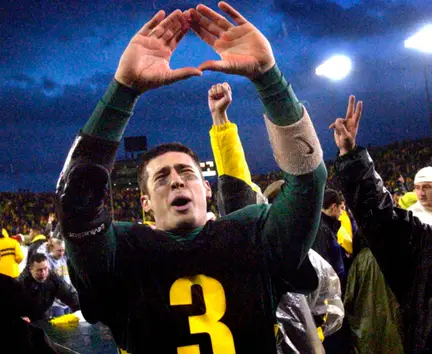The Oregon Ducks football team is a family.
This is something stated often, the family atmosphere that surrounds the football program and its connection to the community. It’s an easy thing to claim, but difficult to fully comprehend until seen first-hand.
It starts at the top, with the majority of the Oregon Ducks coaching staff having been a part of the team for decades, possessing a deep understanding and respect for each other. It is a conscious effort by the coaches to treat each student-athlete with respect and love as if they were all family.
For all the fancy facilities and Nike gear, speak to any past or present Oregon Duck student-athlete and the first thing they will talk about is the family atmosphere at Oregon, the respect everyone has for each other, the brotherhood that exists that has fueled Oregon’s success. It is understandable for a team to think of itself as a family, considering the time commitment. Practice, film study, classes, study hall, treatment, training table, workouts; the time dedication involved by the coaches, staff, and players leaves little for much else.
Yet unlike at some other schools, Oregon openly embraces making sure that people have a life outside of football, and coaches maintain an open door policy to be able to talk about anything at any time. Speak to former student-athletes today, and they still look at their Oregon coaches as father figures, some even go so far as to refer to coaches as “dad” when they see them.

Jared Sawyer’s heartwarming interview of Cristin McLemore
There is a special bond that exists, the Duck brotherhood, this fraternity of Oregon football, often preached at other programs too but rarely embraced as wholeheartedly as at the University of Oregon. It has been entrenched for decades, as long as some of the current coaches have been tenured at Oregon, long before the Casanova Center and Mo and all the Nike toys ever became a realization.
So if every player considers their teammates as brothers and family, what does it mean when there are actual family bloodlines involved in the program? Is there a shadow, a legacy, to perform above and beyond as family has previously done at Oregon? Does having family previously or currently associated with the program make the transition to college easier? Is the shadow and outside pressure of expectations to perform up to the legacy of the last name too much to overcome? And does following in the same position played by their famous relative add extra pressure to live up to great expectations?
I spoke with numerous past Oregon players with family ties within the program to find out what it means to not only be a Duck representing the school, but representing a known family name as well.
“Having actual family ties on the team takes it to another level,” said Brandon McLemore, Oregon Ducks safety (1995-99), whose older brother Cristin McLemore was a star wide receiver for Oregon (1991-95). “You have U of O on your chest and your family name on your back, and you will do anything to represent both positively.”
Brandon McLemore followed his brother Cristin to Oregon and made quite a name for himself as a starting safety in the mid-90s.
Oregon has had plenty of direct family ties over the years stretching back to its earliest days. Over the years many sons have followed in the footsteps of their fathers and uncles, also donning the green and yellow to fight for the University of Oregon like their elders had done previously. Brothers have played side-by-side or followed their siblings to battle after their family legacy was already etched in the record books.
From Oregon’s Huntington duo, Charles (nicknamed “Shy”) and Hollis, leading the Webfoots to victory in the 1917 Rose Bowl, up to present day, family bloodlines run deep. Some names have become Oregon Ducks royalty through the efforts made by multiple members of the family.
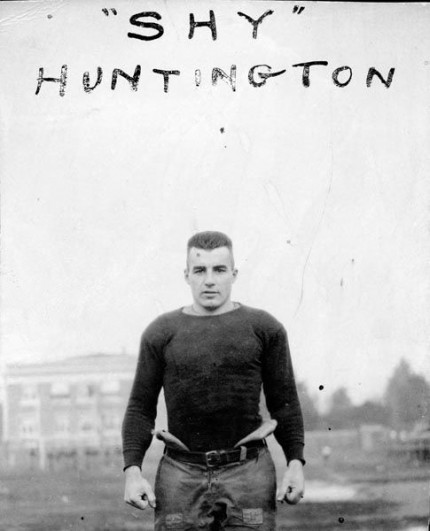
Charles “Shy” Huntington and his brother Hollis were the driving forces behind Oregon’s 1917 Rose Bowl victory over Penn. Photo courtesy: University of Oregon Libraries – Special Collections and University Archives.
John Harrington was the starting quarterback in the first game ever played at Autzen Stadium, three decades later his son Joey became one of the greatest quarterbacks in Oregon history.
Joey Harrington followed in his dad’s footsteps at Oregon, also becoming a starting quarterback for the Ducks.
Eric Winn played fullback with the Ducks going from walk-on to 1st team all-conference fullback, the 4th Winn to suit up for the Ducks after his dad Dick Winn, uncle Harvey Winn, and cousin Mark Winn had all previously played for Oregon.
Eric Winn went from walk-on to 1st team all-conference player for Oregon, carrying on the Winn name with the Ducks after his dad Dick, uncle Harvey, and cousin Mark had all previously played football for the Ducks.
Mike Fouts followed his uncle Dan Fouts to Oregon in the 1970s.
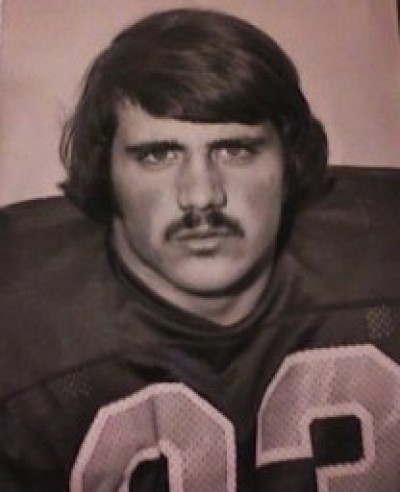
Mike Fouts played at Oregon while his famous relative Dan Fouts was establishing an NFL Hall of Fame career. Mike would join Dan in the pros for a few years after a successful career at Oregon.
Then there is the Wilcox family, brothers Dave Wilcox and John Wilcox both played as Ducks (Dave recently being named one of the top NFL linebackers of all-time and one of seven Oregon Ducks in the NFL Hall of Fame), while Dave’s sons Josh and Justin both had memorable careers with the Ducks in the 1990s.
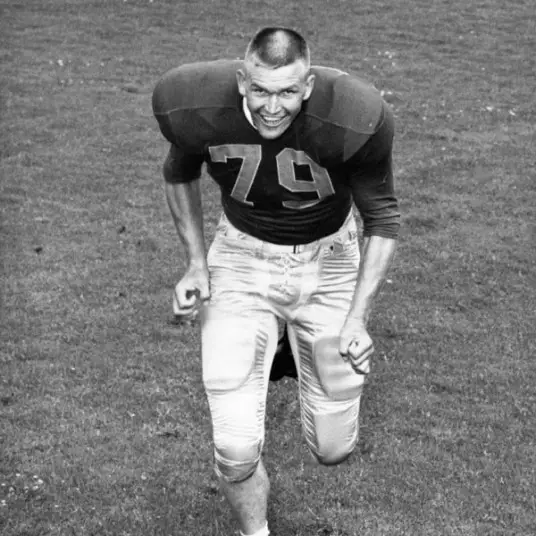
John Wilcox played at Oregon, as did his brother Dave. Dave Wilcox’s two sons Josh and Justin would later have prolific careers as Ducks in the 90s. Photo courtesy: University of Oregon Libraries – Special Collections and University Archives.
The trend has continued recently and will do so well into the future, as Brian Butterfield recently graduated after four years as a safety while his younger brother Ben is a sophomore wide receiver, and the Ducks have a pair of brothers currently committed to join the team next year, Eric and Stephen Amoako.
Over the last two decades alone, Oregon has had a wealth of siblings become Ducks. Patrick Johnson and Dan Johnson, Josh and Justin Wilcox, Markus and Jordan Kent, Matt and Simi Toeiana, Dan and Jed Weaver, Brian and Spencer Paysinger, and the unforgettable Malepeai trio Silila, Tasi, and Pulou, are just a few of the family members that have all donned the green and yellow for Oregon.
Yet despite the family ties, it is interesting to hear that for many the last thing they wanted to do was follow in their older sibling’s shadow, but once on campus the family atmosphere established by the team and coaches as a whole enticed them to become Ducks anyway.
“Cristin was very distant when it came to my recruiting, he wanted me to be my own man,” reflected Brandon McLemore. “Oregon was my last choice when I went through the recruiting process, but all the hosted recruits had such a familiar vibe…it felt like a family, everyone got treated really well, it was authentic, and I decided I wanted to be a part of it too. When I chose Oregon I wasn’t actively looking for that added challenge because my brother was there, I wanted to make my own name.”

Bill Musgrave
For others though, the family ties all but determine well in advance that they will someday be Ducks. Some achieved equivalent or greater fame than the previous relative, while others had their careers derailed by injuries or buried on the depth chart. Most if not all Duck fans may remember the legacy left behind by Bill Musgrave’s heroics, but how many remember his brother Doug Musgrave as a back-up quarterback in the early 90s?
Doug Musgrave, younger brother of legendary Oregon QB Bill Musgrave, rarely played as backup to Danny O’Neil in the early 90s after transferring from Michigan to follow in his brother’s footsteps, never able to emerge from the immense pressure of living up to the Musgrave family name.
How many remember Dan Johnson, brother of the great wide receiver Patrick Johnson? How many remember Simi Toeiana, toiling to live up to the great expectations of matching his brother Matt’s abilities and playing the same position, defensive tackle. For some, competing for a role on the team and with the legacy of family to overcome may be too much to bear.
“My brother and I were ball boys for the Ducks, we grew up around the program as fans,” said Josh Wilcox, a tight end for Oregon in the 90s who played alongside his younger brother Justin for two years (95-96). “We were lucky as kids to be around the team, I knew I wanted to be a Duck all along. I remember Justin and I used to pretend to be Duck players when we were growing up, my dream was always to play for Oregon. I really can’t describe how special it was to represent the UO having grown up with it, I wanted to be a part of carrying on the tradition and making it better.”
Josh Wilcox may have made one of the most memorable catches in Autzen Stadium history here vs. Arizona in 1994, but as a lifelong Oregon Ducks fan he says his favorite moment as a Duck was Kenny Wheaton’s interception vs. Washington the week prior.
Wilcox continued, “That family environment at Oregon is different, we were always part of that growing up, being local just added to the story. We weren’t born when my dad was playing, but there’s just stuff that’s through the blood we got, the intangibles the football gods gave him were given to us as well. Our drive to compete was what made us good. I’ve often been called the most athletic unathletic-guy to play for Oregon, but I wanted to think that I was Dave Wilcox and play as well as my dad did, for the public perception. I wanted to prove to fans that I was more than just my name.”

Patrick Johnson was one of the fastest players in Oregon Ducks history
“Having a sibling play at Oregon was an honor for me, I took great pride in it,” said Patrick Johnson (WR 1994-97), whose brother Dan was a linebacker at Oregon 2000-02. “I talked him into going to Oregon, he had other offers but I wanted to connect him to the program. I was already gone to the NFL when he got there, but he already knew everybody and where everything was, he was clued in, I’m sure it helped immensely in acclimating to the college experience.
I made sure that guys would look after him after I was gone. If I had been in his shoes I would have done the exact same thing, if I already knew the guys, the coaches, how to get around town, etc, it would make perfect sense to go to school there, the transition would be so much easier.”
Patrick Johnson was one of the fastest players in Oregon history, a perennial deep threat that took his talents to the NFL for an extended career. For all his talents though, Patrick believes his brother Dan may have been an even better all-around athlete, had injuries not derailed Dan Johnson’s career.
However, for some like Dan, even with big brother looking out for him, the harsh impact of the game can take its toll. Despite the gifted athletic ability Dan possessed that Patrick claims were above his own overall abilities and drive to potentially play in the NFL, injuries derailed Dan Johnson’s career.
“I missed my first fall camp because of a hernia surgery,” Dan Johnson recalls. “I missed the whole season, then the next year I had four surgeries, two just on my knee alone. I tore an ACL, partial tear of my MCL, 25% of meniscus removed, microfracture surgery, all on the same knee. It took me a year and a half of rehab just to have a normal walk. Then I tore the flexor tendon in my ring finger and had to wear a cast half the year. But a lot of guys get hurt, that’s just part of the game.
I tried to play all out, I had no regards for my body at all, and unfortunately with all the injuries it just never came together for me. But it’s more fun that way, to play with reckless abandon, and yeah I was driven to be more than just Patrick Johnson’s brother. I had a lot of injuries, but I would still do it all over again, I loved every second of it. There is nothing like running out onto Autzen behind that motorcycle. And being there carrying on the name with everything that Patrick had done at Oregon was great, but there was so much camaraderie with the teams it felt like we were all family anyway.”
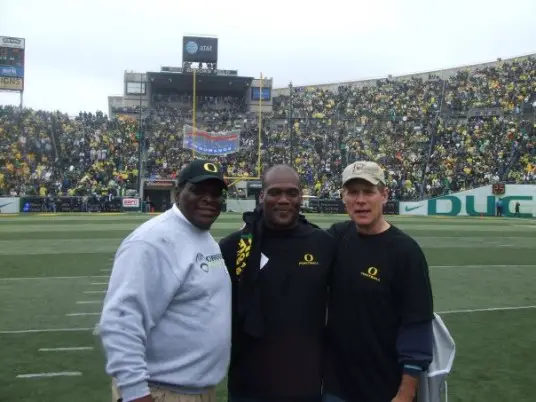
Dan Johnson (center) may have had his career derailed by injuries, but he’s still a diehard Duck for life, returning to Autzen Stadium often to reconnect with former teammates and coaches.
“Despite the injuries, he had a great experience being able to participate in college athletics and get his education,” Patrick Johnson said of his brother Dan. “He went the JC route, then came to Oregon, he earned his way to Oregon, a lot of kids would have quit but he made the most of his opportunity. I am so proud of him.”
But what of trying to escape from behind the shadow left behind by an older sibling, is there an added drive to succeed beyond their predecessor? For some, their positions permitted direct competition in practice offense vs. defense, like Brandon McLemore (safety) covering his brother Cristin (WR), or the Butterfield’s Brian (safety) and Ben (WR), and the Malepeai’s Silila (nose tackle) vs. Tasi (offensive guard) and Pulou (fullback). Surely there must have been a little extra angst to want to beat their siblings when facing each other in practice?
“Cristin set the bar so high, he had such a flashy persona, it was a steep challenge to me to match and even beat that,” said Brandon McLemore. “My first year I played corner on the scout team so we lined up against each other often, I remember we really got after it in preparation for the Cotton Bowl, I think I held my own, I enjoyed the challenge.”
Cristin McLemore set many records during his time at Oregon, but he is perhaps best known for this remarkable touchdown catch in the Rose Bowl.
“I remember in 95′ when we were lining up against each other in practice, it was about even,” Cristin McLemore recalls. “It was probably a draw, and since he (Brandon McLemore) was a true freshman at the time he gets the nod. Yeah there were a few times it got physical, but I don’t think it was any different from any other teammate.”
“It had to be difficult for Justin (Wilcox) living up to expectations,” said Josh Wilcox of his younger brother, now a rising star in the world of college football coaching, currently the defensive coordinator at Tennessee. “If anyone could live up to the expectations after Dave and Uncle John and myself though, it was Justin. It helped that he already knew some of the guys, so he was already acclimated. It was probably easier for him to transition into the Duck family, but he definitely earned it though…it doesn’t ultimately matter what your name is on the back of your jersey.”
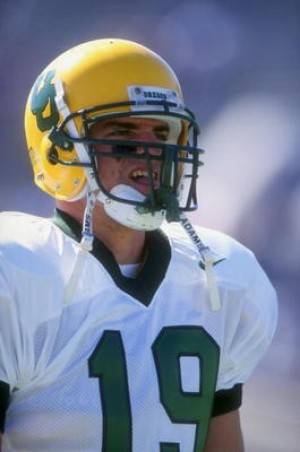
Justin Wilcox had three legendary Wilcox-predecessors to follow (John, Dave, Josh), yet despite massive expectations that could have been overwhelming to some, he became a great player in his own right for the Ducks.
Some may not have taken it so lightly on their family…For the Malepeai brothers, for a time where all three were on the Oregon roster, competition got fierce.
“I remember one practice where Silila would be on the nose, and it would be a center, Danny (O’Neil) and me, and Silila would have to fight off his blocker and it would be just us going head-to-head,” Pulou Malepeai remembers, the youngest of the trio who played fullback at Oregon 1993-96. “One rep doing this drill Silila fought off his blocker and it was me and him one-on-one, I gave him a shoulder and knocked him over and scored. I gave him a look like ‘Ha! I got ya, bro!’ but at the end of the day we’re still brothers and one big happy family.”
“Silila used to beat me all the time, push me harder, not to rely on my weight but to get my legs under me,” said Tasi Malepeai, an offensive guard for Oregon 1992-96, the middle brother but most daunting of the Malepeai trio as one of the largest human beings to ever suit up for the Ducks. “Having my brothers on the team was the biggest difference for me, it made the transition so much easier. I got to meet his friends, he showed me where to go. Having him as a teammate, he taught us how to fight together. We’d go at it in practice, but people respected us because two brothers were fighting so hard, yet at the end of the day we’re still brothers. Coach Brooks used to say that our passion for the game and each other was rubbing off on everybody else, making the rest of the team practice harder. Having my brothers on the team was just icing on the cake, I got to go to war with them every Saturday, nothing can top that feeling.”
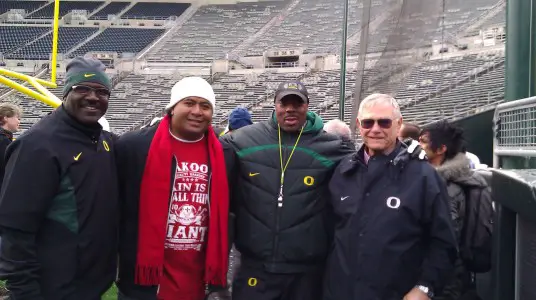
Silila Malepeai (2nd from left) visits with some of his former coaches before last year’s game vs. Arizona
Silila, the oldest and first of the Malepeai’s to transition from Hawaii to life in Oregon, looks back on the Malepeai family connection with the Ducks with immense pride.
“Having them (Tasi and Pulou) on the team, it was great, we all come from the same background, we had a bond that was unbelievable. It’s infectious, we took a liking to everybody, and being from Hawaii we missed our little state so we made sure everybody from the islands was alright, made it more of a family atmosphere. The team got a lot closer when my brothers got there because they could feel the love we had for each other. You’re grinding 24/7, it’s not just practice but everything else too, so we were basically raising each other. I made sure their transitions to college went smoother, ensured they felt at home. I was able to explain to them the difference in playing ball from high school to college. But make no mistake, when we competed in practice, growing up the oldest in Hawaii and then going into college, I would never let them win!(laughs) Having family on the team meant that we could keep each other in check in the classroom, completing the task at hand, staying on top of each other to finish our schooling and achieve our degrees.”

Malepeai
Over the years there may have been players at Oregon that were bigger or faster or stronger, but NOBODY appeared to be having more fun playing football than the Malepeai brothers.
“I still talk to the Oregon coaches all these years later,” said Tasi Malepeai, now a high school assistant coach in Honolulu, HI. “Coach (Steve) Greatwood comes out to Hawaii when he’s recruiting, so I make sure to talk to him whenever I can. For me, Coach Greatwood and Coach (Neil) Zoumboukis were the greatest coaches I could have had. They made the whole experience, they made it the best possible environment to work in, they made us understand that there was a reason behind everything and a right way to do things. All these years later I still love Oregon, love my old teammates, and the coaches, we’re all one big family.”
Pulou Malepeai, as the youngest, getting to spend time in school surrounded by his older brothers, had no problem in finding motivation to compete.
“Having family boosted me so much more, having my brother blocking for me and Silila trying to stop me in practice, it was more warrior-like, it upped the stakes even higher wanting to compete. It was a huge motivating factor for me, I really wanted to take down Silila sometimes in practice, remembering all those little fights growing up…but we left everything on the field, at the end of the day we’re still brothers.”
“A lot of the relationships and the way they’re built are by showing that I’m there for you and vice versa,” said Cristin McLemore. “Football is a family dynamic anyway. That whole bond gets exemplified when you can share it with someone you know, it’s infectious. Having those brother relationships and those connections is what can make or break a team, so having actual family is fantastic. I think our legacy as brothers is that when we came here we left everything on the field.
They gave us a chance for a life that most don’t get, we were cognitive of that and have remained appreciative of it, we are still very involved in the program, whatever is within our power to help we will do. I had so much pride watching Brandon play, and then when he made it up to the NFL also that was amazing. I still remember him hitting Chad Johnson so hard he knocked his helmet off.”
“I’m proud to be a part of the family name, the Oregon family,” said Josh Wilcox. “Maybe I didn’t represent it the best I could have all the time, but with the standards we set, the way we drove ourselves, and how hard we played I take immense pride in being a Wilcox and a Duck.”
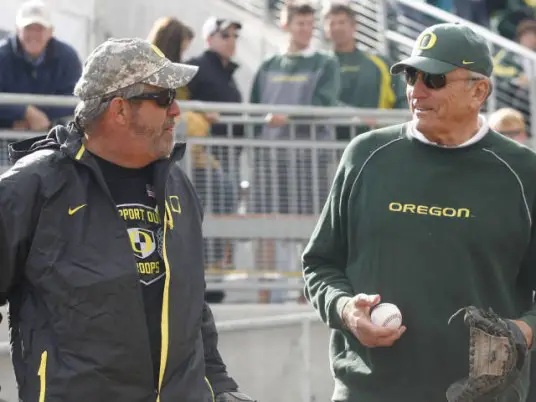
Dan Fouts (left) and Dave Wilcox (right) remain close to the Oregon program, as do their family members that also have UO football ties.
“The legacy of the family name to me is making plays when they were needed,” said Brandon McLemore, “being a true Duck, playing hard, working hard, and taking care of your brothers on the team. Cristin is my brother, but I had 85 brothers when I played. We tried to represent the UO with class, with the understanding that the football team is a family. We still preach to this day that it is a family.”
“One of the reasons why Oregon gets better every year is because the older guys always try to send down the knowledge to the younger guys coming up,” said Dan Johnson. “It was awesome being able to follow Patrick to Oregon, but everyone on the team is family, we’re all Ducks.”
“Playing alongside your brothers, you feel the bloodlines, see it through each other’s eyes,” said Pulou Malepeai. “It adds extra incentive, makes you more determined, when games were wearing on I could be in the huddle and look in Tasi’s eyes and know that my brother will do anything for me, so I will do anything for him, it was added motivation.”
Whether literal family connections or metaphorical through shared sacrifice, the family atmosphere that comes with playing football at Oregon lasts a lifetime. The drive to compete for your brothers on the team will be engrained for years to follow thanks to the veteran coaching staff at Oregon, and the close-knit connection between the team and its fans.

Cristin McLemore
“Oregon has the best fans in the world, that whole Autzen experience is something I will never forget and hopefully pass on to future Ducks,” said Tasi Malepeai. “It was the most fun I ever had, still to this day I watch every game, and no matter what win or lose I bleed green and yellow.”
“I have been around to a lot of stadiums,” Dan Johnson said, “I’ve seen a lot of fan bases, but Oregon is right there among the best. We could go 1-10 and we’d still sell out the Civil War. We have awesome fans, their support means everything to the guys.”
“I want to say thank you to the fans for their time and commitment in cheering for us, please don’t stop, stay true to being a Duck,” said Cristin McLemore, and his brother Brandon also shared a similar sentiment.
“It can’t be created in any other situation, not even in the pros, it’s so organic. At Oregon there’s a deep-hearted genuine friendly feeling.”
It is a fraternity, a brotherhood, a family. Oregon coaches players and fans, all intertwined supporting each other have been the primary cause for the Ducks success. It has been an organic climb to the top through building the foundation of brotherhood. For the foreseeable future those bonds formed be it by blood or in sweat will remain as close as ever in the Oregon football family.
These are articles where the writer left and for some reason did not want his/her name on it any longer or went sideways of our rules–so we assigned it to “staff.” We are grateful to all the writers who contributed to the site through these articles.

